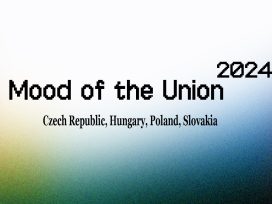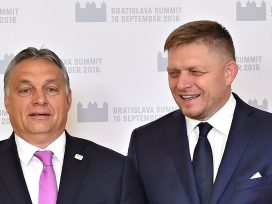Recently, the Dalai Lama visited Hungary. Someone in the audience asked if the healing heart chakra of the earth really is located in Hungary, more precisely, in the small mountain below the village of Dobogókö, because if it is so, and everyone found out, our problems would be solved in an instant. The Lama paused for a moment, then said that this was an interesting question. Not long ago, in Mexico, a Mexican audience member asked him the same question about a Mexican mountain. For the purposes of this article, I too will pretend that Hungary is the center of the world and will contrate exclusively on Hungary, but will try to emphasize motifs that may also serve as general lessons.
 My situation is simple and difficult at the same time, because Hungarian history and today’s politics stemming from it, is full of conflicts. It seems there are only conflicts: floods, dumps and avalanches of conflicts. It seems as if we were living in a perpetual state of crisis, with only a few examples of tranquil rebuilding, of reconciliation, of settlement. Hungarians, as they are often described, are a peaceful, meek, hospitable people, but for some reason they immediately join all of Europe’s wars with a good instinct for siding with the future losers. Our revolutions were put down, and over the course of the last hundred years we fell victim to and lost World Wars, were occupied first by the Germans and then by the Soviets, and in addition we even lost the football World Cup final in 1954 (nota bene as a result of hair-raising referee errors).
My situation is simple and difficult at the same time, because Hungarian history and today’s politics stemming from it, is full of conflicts. It seems there are only conflicts: floods, dumps and avalanches of conflicts. It seems as if we were living in a perpetual state of crisis, with only a few examples of tranquil rebuilding, of reconciliation, of settlement. Hungarians, as they are often described, are a peaceful, meek, hospitable people, but for some reason they immediately join all of Europe’s wars with a good instinct for siding with the future losers. Our revolutions were put down, and over the course of the last hundred years we fell victim to and lost World Wars, were occupied first by the Germans and then by the Soviets, and in addition we even lost the football World Cup final in 1954 (nota bene as a result of hair-raising referee errors).
Twenty years ago, our country became independent. We could finally take our fate into our own hands. The possibility for peaceful construction opened. Yet there’s not much to talk about with regards to serene development. Since we have not been able to come to terms with our own past, tensions and frustrations are still with us. Dialogue between various social groups can’t even begin, fails, or runs off course. If a nation is a group of people who are connected by shared memories and mutual plans for the future, then it seems that we have few shared memories that could be the basis of common plans and hopes. For us, memories and traditions are not the starting points of self-definition or self-knowledge, but a cluster of topics that generate further arguments, discord and strife. In the past few years, these political differences have sunk nearly to a level of tribal warfare. It seems illustrative (to use another football motif) that during the street riots of a few years ago, many football ultras from different clubs took part, interestingly enough setting aside the differences they uphold in the stadiums.
So it seems that during the past twenty years, we have not quite succeeded in understanding and processing neither our past nor the new experience of freedom. In a new, transformed shape, old conflicts live on. There is no general social agreement and the contradictory past still weighs down upon us, for example the “heritage” of national socialism or communist internationalism.
When I began my career as a writer in the communist dictatorship, I was confronted with a dilemma: either I gave in to power (though few chose this path anymore in the 1980s), or I joined the counter-culture. There seemed to be no other appealing alternative. Basically, even then, all expressions were placed in an ideological context. If I wanted to write about my girlfriend’s earlobe or my shoelace, it wasn’t about my girlfriend’s earlobe or my shoelace, but served to tease the authorities as a critique of socialist-realist themes and style, or as a manifestation of my bold stance. If I experimented with the depiction of private things anyway, the other side scoffed too, annoyed that while the nation was groaning in the shackles of communism, I was bothered with my girlfriend’s earlobe. The earlobe was simply ground up between the millstones of ideologies.
The change of regime in 1989 allowed writers the possibility not to participate in politics. Henceforth, we could write freely about lobes and laces. But today’s situation nevertheless reminds me of the 1980s. In this atmosphere, compulsively and perversely imbued with politics, it is difficult to speak intelligently about the issues of the community, of the demos, to speak in hopes of a real dialogue. Even today, all public expressions necessarily take the form of an ideological argument and most probably end in hostility. Exaggerating a little, we could say that even now, readers look for hints on whether the writer talks about the right or the left earlobe, the right or the left shoelace, to see which side he or she is on. It is not the quality of the idea that counts, but who thought it and what message can be interpreted into it. Not only did the Nobel Prize awarded to Imre Kertész for his book Fateless fail to result in public agreement or catharsis, even a small group of writers received the news with indifference or criticism, merely because of Kertész’s openly liberal beliefs.
But let’s take an example from history instead: the question of nationality. Central Europe is a patchwork quilt from this perspective. Here, people, nationalities and ethnic groups live one on top of the other. Once upon a time in the Habsburg Empire, the Hungarian Kingdom was a kind of primus inter pares among the nationalities, with certain privileges. It’s not easy to admit, but these privileges included measures and laws that were directed towards the assimilation of various nationalities. Today, admitting these facts or even mentioning them in certain circles is regarded as treason. But let me continue the story: these assimilation aspirations led to the strengthening of nationality movements and to conflict. At the end of the first World War, Hungary lost two-thirds of its territory and many Hungarians ended up under foreign jurisdiction. At the beginning of the second World War, these territories were re-annexed only to be annexed again, along with several million Hungarians, at the end of the war. You can imagine how much destruction and human suffering these events caused, how much mutual accusation, pain and frustration accumulated on every side along the lines of national narratives.
In contrast to other nationalities, the assimilation of Jews seemed to be progressing smoothly. But the events of the twentieth century traumatized this coexistence as well and today manifests itself, for example, in this absurd question demanding a clear-cut answer: Who should we mourn more, the hundreds of thousands who were killed at the Don River Bend or the several hundred thousand Hungarian Jewish victims of the Holocaust? There seems to be little possibility at the moment for atonement and absolution, for remembering the victims and mourning together in order to heal ourselves. Though I think of my uncle killed at the Uriv Bridge and a friend’s grandparents who died in the Holocaust, I have no way to do this together with my compatriots.
Throughout the twentieth century, not only Hungarians, but all social groups in Hungary suffered serious losses and were humiliated, and so far we have not been able to process, discuss and resolve our conflicts and injuries. Over the past twenty years, politics have monopolized this painful and lopsided past in such an effective and violent way that, for example, the 1956 anti-socialist revolution has several parallel and even completely opposing interpretations, formulated along the lines of various ideological and party interests.
In this hysterical atmosphere it is not easy for an intellectual to remain calm, unbiased and independent. Recently, there was a dispute on a Hungarian literary website. The participants were mostly well-known writers and critics. The site – though I may be wrong – attracts primarily leftwing or liberal-minded readers and writers. The sentence that ignited the argument was the following: “If only cosmopolites would rid themselves of their phobias and nationalists would shake off their frustrations, a modern national consciousness could emerge.” (István Kemény)
This sentence triggered heated and vehement comments in the website’s forum. According to some, the first part of the sentence is openly anti-Semitic. Others tried to initiate an objective analysis of the quote, trying to signify which tone or register could be suitable for carrying out this discussion. The sentence itself might be oversimplifying and superficial, but the effort to begin some kind of dialogue or mediation can’t be overlooked. It seems to be suggesting that both parties should practice some kind of self-restraint, that they should “hold their horses” and search their souls. There is no definite proof – as some comments claimed – that the cosmopolite in this context is a stand-in for Jews. The term, if we’re looking for something to pair it with, might be similar to liberal. Liberals may also have phobias, whether they are Jewish or not. Still, a real dialogue could not develop, since both sides defended their standpoints, rigid and offended.
The sentence above was smacked primarily from the left side (onto the right cheek), but it’s quite possible that on another website, it could have been the other way around: the left cheek could have been smacked from the right side by those interpreting the second half of the sentence as attacking national sentiments.
This is a good illustration of how important language, words and concepts are in such disputes. The opposing sides couldn’t even agree on the meaning of the words, so a substantial discussion could not even begin. Over the course of the historical turmoil and political transformations of the past one hundred years, the meaning of many basic concepts has become contradictory and muddled, which makes it difficult to word one’s ideas exactly, without causing any confusion. However, one positive thing is that the commentators sensed this linguistic aspect. After all, they are literati, word artists. The initiation of dialogue is not easy in a language where the synonyms of “patriot” (hazafi, patrióta) have opposite meanings, because one of them was monopolized by the Left and the other by the Right. In a complicated and poisoned lingual space as this, the only obvious way to express your ideas is with heightened care and precaution.
At the end of the argument, an idea came up which suggested that the existing outdated and unsuitable system of concepts should be exchanged for a completely new one in hopes of a fresh dialogue. I find this idea difficult to carry out. This language contains our history and its own history too. These words, no matter how compromised, connect us to our memories, our traditions, culture and myths. This is the language that can bring us closer to ourselves. I don’t think that a quasi-artificial language can open a new era. At the same time, it is possible that the next generation, the young people, will have had enough of the bandwagons and unproductive animosity, and will define themselves along the lines of new paradigms. As a young commentator wrote: if not through the use of new concepts, perhaps by reinterpreting existing concepts and by placing them in new frames, we could move forward. We would need “new narrative modes, new ideas to be found, constant correction and self-reflection, the cautious and responsible usage of words, of forming them anew.” (György Vári) I could even imagine that the democratic culture of the Internet, which speaks in a new language, can help overwrite these seemingly immovable differences.
In today’s Hungary, any intellectual that feels responsible for the community and tries to mediate, faces serious difficulties. Anyone who wants to write about public issues and social questions, independently and unbiased, can easily be forced into a strict dichotomy and mindless political logic. To speak up requires a certain courage, because each word could touch a nerve. One must understand that by trying to remain in the middle, one could easily be labeled a traitor or be viewed as the agent of either side. Standing in between the trenches on no-man’s-land, one could be shot at from both sides, ending up not independent and genuine, but a turncoat moral victim.
I must stress that I don’t absolutely believe it to be compulsory for individual writers to directly take the burdens of the nation or humanity on their shoulders. I think that if someone writes a good text, it enriches the culture of the nation, independent of the topic, increasing its strength and immunity and serves to promote self-knowledge and reconciliation. Human relations portrayed in the proper complexity and depth discredit the simplifying schemes of the political perspective. Or in other words, an internal illustration of a world view or mentality can be comprehended and experienced by all readers, independent of political affiliation. My new novel, Face and About-face, is set in a Hungarian army barracks in the 1970s. I don’t think that I’m mistaken when I say that this book is not exclusively against the communist dictatorship, but against all dictatorships, past and future. I expressly endeavored to make sure it could not be interpreted by using primary political models of explanation.
In Hungary today, published works generally talk about social tensions indirectly. The impression of war in politics, the confusion of the present and the failure of sharply political works, deter writers from experimenting with such topics. Of all the genres, it is theater that might shoulder these types of expressions the best. The stage is well suited for the dramatic illustrations of opposing forces.
However, Hungarian writers do play active and concrete roles in the public sphere. After the change of regime in 1989, Árpád Göncz was the President of the Republic for a long time, and today several writers hold seats in the parliament.
I believe that any intellectual who strives for reconciliation and takes on the role of mediator must be very careful to maintain their authenticity. If they do not wish to add to the amount of pointless disputes, they must be familiar with the thinking, the culture, the memories and value preferences of the opposing communities and social groups. They must also be aware that in this embittered situation, quick results can not be expected. So the key words are: authenticity, empathy, advance and approach, gradualness, patience, and linguistic awareness.
The goal is obviously the mutual, common attainment of the culture of democracy. We should develop the capacity for forgiveness and dialogue, the creation of common plans for the future. This will most certainly not happen from one day to the next. Unless it unexpectedly turns out that the earth’s healing heart chakra is in the mountain under the village of Dobogókö. Unfortunately, the chances seem to be slim at the moment.
This article is based on a speech held at the Jerusalem Book Fair on 22 February 2011.

 My situation is simple and difficult at the same time, because Hungarian history and today’s politics stemming from it, is full of conflicts. It seems there are only conflicts: floods, dumps and avalanches of conflicts. It seems as if we were living in a perpetual state of crisis, with only a few examples of tranquil rebuilding, of reconciliation, of settlement. Hungarians, as they are often described, are a peaceful, meek, hospitable people, but for some reason they immediately join all of Europe’s wars with a good instinct for siding with the future losers. Our revolutions were put down, and over the course of the last hundred years we fell victim to and lost World Wars, were occupied first by the Germans and then by the Soviets, and in addition we even lost the football World Cup final in 1954 (nota bene as a result of hair-raising referee errors).
My situation is simple and difficult at the same time, because Hungarian history and today’s politics stemming from it, is full of conflicts. It seems there are only conflicts: floods, dumps and avalanches of conflicts. It seems as if we were living in a perpetual state of crisis, with only a few examples of tranquil rebuilding, of reconciliation, of settlement. Hungarians, as they are often described, are a peaceful, meek, hospitable people, but for some reason they immediately join all of Europe’s wars with a good instinct for siding with the future losers. Our revolutions were put down, and over the course of the last hundred years we fell victim to and lost World Wars, were occupied first by the Germans and then by the Soviets, and in addition we even lost the football World Cup final in 1954 (nota bene as a result of hair-raising referee errors).




